12 feb 2016

The Rafah border crossing between Egypt and the Palestinian Gaza Strip will be open Saturday and Sunday, February 13 – 14.
The opening was ordered by Egyptian President Abdel Fatah Al-Sisi. Egypt wants to normalize the opening of the Rafah border crossing but insists that the Palestinian side would have to be controlled by the Palestinian Authority and not by any single Palestinian faction. It were especially parts of the Palestinian Hamas that were and may still be involved in supporting insurgents in Egypt’s Sinai province.
The Rafah border crossing has been ordered to be reopened in both directions on Saturday and Sunday. It is the first time in three months that the border crossing will be open. The border checkpoint has been sporadically opened to facilitate travel and not least much-needed humanitarian aid for the besieged Palestinian enclave.
Tensions between Egypt and Gaza arose when Hamas took over the Gaza Strip in 2007. Egypt has largely kept the Rafah border crossing closed since the ouster of Egyptian President Mohamed Morsi in 2013.
The ouster of Morsi by a people-powered military coup led to intense tensions between Hamas, which rules the Gaza Strip and the post-Morsi administration. Both Hamas and the ousted government of Mohamed Morsi are part of the Muslim Brotherhood that has been outlawed in Egypt after the 2013 ouster of the Morsi administration.
It is noteworthy that there is an internal dispute in Hamas concerning the party’s and its military wing, the Al-Qassam brigades interference in internal Egyptian affairs. Senior Hamas legislator Yahia Mousa, for example, warned in July 2013, that Hamas would pay a heavy price for interfering in Egypt’s domestic political affairs.
Elements of Hamas have since 2013 been involved in supporting Muslim Brotherhood and later on Islamic State associated insurgents in Egypt’s North Sinai province. Most notable among them is Ansar Bayt Al-Maqdis which changed its name to Wilayat Sinai after it pledged allegiance to the self-proclaimed Islamic State.
Egyptian Government Wants to Normalize Opening of the Rafah Border Crossing.
Egypt’s administration led by President Abdel Fatah Al-Sisi has on numerous occasions expressed that it wishes to normalize the opening of the Rafah border crossing to help break the Israeli siege on the coastal Palestinian enclave.
Egypt also expressed regrets that the cooperation between elements of Hamas and insurgents in North Sinai forced the Egyptian military to bust smuggling tunnels which also are a vital life-line for the besieged Palestinians.
Al-Sisi has on several occasions pledged that Egypt would normalize the opening of the Rafah border crossing as soon as the Palestinian side of the border is controlled and administrated by the Palestinian Authority instead of being controlled by any single Palestinian faction, whether it be Hamas or any other one. The Palestinian side is currently controlled by Hamas.
Egypt and Egyptians have themselves paid a heavy price due to the cooperation between elements of Hamas and insurgents in Egypt. Last year Egypt evacuated a one kilometer wide security zone along the border between Egypt and Palestine’s Gaza Strip and had to re-locate residents from the area.
The administration of President Al-Sisi has further pledged that it would help train Palestinian Authority border guards and that Egypt, if invited, could deploy troops to guarantee the sovereignty and security of Palestine once Israel ends its illegal occupation of Palestinian territories. The normalization of the Rafah border crossing, and with it the busting of Israel’s siege remains elusive as long as the formation of an all-Palestinian government that can enforce border controls in the Gaza Strip has not been achieved.
The opening was ordered by Egyptian President Abdel Fatah Al-Sisi. Egypt wants to normalize the opening of the Rafah border crossing but insists that the Palestinian side would have to be controlled by the Palestinian Authority and not by any single Palestinian faction. It were especially parts of the Palestinian Hamas that were and may still be involved in supporting insurgents in Egypt’s Sinai province.
The Rafah border crossing has been ordered to be reopened in both directions on Saturday and Sunday. It is the first time in three months that the border crossing will be open. The border checkpoint has been sporadically opened to facilitate travel and not least much-needed humanitarian aid for the besieged Palestinian enclave.
Tensions between Egypt and Gaza arose when Hamas took over the Gaza Strip in 2007. Egypt has largely kept the Rafah border crossing closed since the ouster of Egyptian President Mohamed Morsi in 2013.
The ouster of Morsi by a people-powered military coup led to intense tensions between Hamas, which rules the Gaza Strip and the post-Morsi administration. Both Hamas and the ousted government of Mohamed Morsi are part of the Muslim Brotherhood that has been outlawed in Egypt after the 2013 ouster of the Morsi administration.
It is noteworthy that there is an internal dispute in Hamas concerning the party’s and its military wing, the Al-Qassam brigades interference in internal Egyptian affairs. Senior Hamas legislator Yahia Mousa, for example, warned in July 2013, that Hamas would pay a heavy price for interfering in Egypt’s domestic political affairs.
Elements of Hamas have since 2013 been involved in supporting Muslim Brotherhood and later on Islamic State associated insurgents in Egypt’s North Sinai province. Most notable among them is Ansar Bayt Al-Maqdis which changed its name to Wilayat Sinai after it pledged allegiance to the self-proclaimed Islamic State.
Egyptian Government Wants to Normalize Opening of the Rafah Border Crossing.
Egypt’s administration led by President Abdel Fatah Al-Sisi has on numerous occasions expressed that it wishes to normalize the opening of the Rafah border crossing to help break the Israeli siege on the coastal Palestinian enclave.
Egypt also expressed regrets that the cooperation between elements of Hamas and insurgents in North Sinai forced the Egyptian military to bust smuggling tunnels which also are a vital life-line for the besieged Palestinians.
Al-Sisi has on several occasions pledged that Egypt would normalize the opening of the Rafah border crossing as soon as the Palestinian side of the border is controlled and administrated by the Palestinian Authority instead of being controlled by any single Palestinian faction, whether it be Hamas or any other one. The Palestinian side is currently controlled by Hamas.
Egypt and Egyptians have themselves paid a heavy price due to the cooperation between elements of Hamas and insurgents in Egypt. Last year Egypt evacuated a one kilometer wide security zone along the border between Egypt and Palestine’s Gaza Strip and had to re-locate residents from the area.
The administration of President Al-Sisi has further pledged that it would help train Palestinian Authority border guards and that Egypt, if invited, could deploy troops to guarantee the sovereignty and security of Palestine once Israel ends its illegal occupation of Palestinian territories. The normalization of the Rafah border crossing, and with it the busting of Israel’s siege remains elusive as long as the formation of an all-Palestinian government that can enforce border controls in the Gaza Strip has not been achieved.
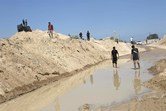
Egyptian military forces on Thursday destroyed an underground concrete tunnel passing from the northern Sinai Peninsula into the Gaza Strip.
The Egyptian Ministry of Defense said in a statement that soldiers discovered and destroyed the 1.2-meter-wide tunnel spanning 35 meters and lying nine meters below ground.
The tunnel was equipped with two power cables, two lighting cables, and two telephone lines, according to the statement.
The ministry claimed the tunnel had been used to smuggle people, weapons, and ammunition into Gaza.
Palestinians in Gaza have relied on underground smuggling tunnels across the Egyptian border since 2007 when Israel imposed a military blockade on the coastal enclave after Hamas took control there.
The tunnels have since provided a vital lifeline for the besieged territory's more than 1.8 million residents.
However, Egypt has destroyed and flooded hundreds of the tunnels as part of an ongoing security campaign in the northern Sinai Peninsula against anti-regime militants launching attacks on Egyptian police and military personnel.
Egypt accuses Hamas of supporting the insurgents, allegations Hamas strongly denies.
Israel's Energy Minister Yuval Steinitz told Israeli media earlier this week that a number of tunnels had been flooded at Israel's request, adding that relations between Egypt and Israel were "better than ever."
Human Rights Watch last year slammed Egypt's military for its campaign against the tunnels, during which the group said some 3,200 families had been evicted from their homes near the border and hundreds of acres of farmland destroyed.
The group said Egypt had failed to provide adequate proof that insurgents were receiving support from Gaza.
The UN reported Thursday that only a few tunnels remained partially operational between Egypt and the Gaza Strip.
The Egyptian Ministry of Defense said in a statement that soldiers discovered and destroyed the 1.2-meter-wide tunnel spanning 35 meters and lying nine meters below ground.
The tunnel was equipped with two power cables, two lighting cables, and two telephone lines, according to the statement.
The ministry claimed the tunnel had been used to smuggle people, weapons, and ammunition into Gaza.
Palestinians in Gaza have relied on underground smuggling tunnels across the Egyptian border since 2007 when Israel imposed a military blockade on the coastal enclave after Hamas took control there.
The tunnels have since provided a vital lifeline for the besieged territory's more than 1.8 million residents.
However, Egypt has destroyed and flooded hundreds of the tunnels as part of an ongoing security campaign in the northern Sinai Peninsula against anti-regime militants launching attacks on Egyptian police and military personnel.
Egypt accuses Hamas of supporting the insurgents, allegations Hamas strongly denies.
Israel's Energy Minister Yuval Steinitz told Israeli media earlier this week that a number of tunnels had been flooded at Israel's request, adding that relations between Egypt and Israel were "better than ever."
Human Rights Watch last year slammed Egypt's military for its campaign against the tunnels, during which the group said some 3,200 families had been evicted from their homes near the border and hundreds of acres of farmland destroyed.
The group said Egypt had failed to provide adequate proof that insurgents were receiving support from Gaza.
The UN reported Thursday that only a few tunnels remained partially operational between Egypt and the Gaza Strip.
7 feb 2016
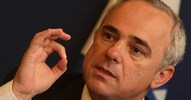
Israel’s energy minister Yuval Steinitz called for following the Egyptian model of flooding Gaza border in order to find out and destroy resistance tunnels.
Minister Steinitz said Saturday during an event in the southern city of Beersheba that the Egyptian military had flooded several tunnels beneath the Gaza Strip’s southern border at Israel’s request.
The energy minister said that Egyptian President Abdel-Fattah el-Sissi had ordered the destruction of numerous tunnels built by Hamas at Israel’s request.
"Security coordination between Israel and Egypt is better than ever. The best means to end the threat of Hamas Gaza tunnels is flooding the border with water”, Steinitz said.
Minister Steinitz said Saturday during an event in the southern city of Beersheba that the Egyptian military had flooded several tunnels beneath the Gaza Strip’s southern border at Israel’s request.
The energy minister said that Egyptian President Abdel-Fattah el-Sissi had ordered the destruction of numerous tunnels built by Hamas at Israel’s request.
"Security coordination between Israel and Egypt is better than ever. The best means to end the threat of Hamas Gaza tunnels is flooding the border with water”, Steinitz said.
25 jan 2016

The Arab Organization for Human Rights In the UK (AOHR UK) on Monday submitted two communications to the Office of the Prosecutor of the International Criminal Court (ICC) inviting the Prosecutor to investigate and prosecute both the deliberate infiltration of seawater into the territory of Gaza by Egyptian forces, and the closure of the Rafah crossing.
Both acts are constitutive of war crimes and crimes against humanity and are therefore acts under the subject-matter jurisdiction of the ICC, AOHR clarified.
The ICC also enjoys temporal and territorial jurisdiction over the crimes exposed in both communications because the State of Palestine acceded the Rome Statute in January 2015 and issued a declaration under article 12(3) of the Statute accepting the Court’s jurisdiction since 13th June 2014.
With these filings, the AOHR seeks to put an end to the oppressive and criminal policy of the Egyptian authorities at the border and hold those responsible accountable before an international court.
Since 2006, 1.8 million Palestinian citizens residing in Gaza have been subject to occupation and blockade.
Nevertheless, both the siege and the humanitarian crisis were exacerbated in mid-2013, when a military coup ousted Egypt’s first democratically elected president and inaugurated one of the darkest periods of abuse and oppression in the country’s history.
The arrival of Abdel Fattah al-Sisi to the Egyptian presidency marked a profound change in Egypt’s foreign policy towards Gaza; since July 2013 a pattern of attack, abuse and oppressive action by the Egyptian military regime directed against the civilian population of Gaza is readily identifiable. These actions follow a plan or policy aimed, supposedly and officially, at fighting terrorism in the region, but also at pressing the Gaza population.
The first measure of this policy was the de facto closure of the Rafah crossing. Given the occupation and blockade, this crossing was of key relevance for Gaza’s citizens, as it constituted their only escape valve, and the main channel of import for basic resources. However, since July 2013 the crossing has been almost permanently closed.
According to the UN Office for the Coordination of Humanitarian Affairs, between October 2014 and October 2015 the Rafah border crossing was open for passage for a total of only 37 days. As a result, there are currently 30,000 Palestinians registered as humanitarian cases waiting to leave Gaza via Rafah.
Toby Cadman, International Criminal Law expert and head of legal team advising AOHR, notes, "The Egyptian policy in the border constitutes a clear violation of the laws of war and shows evident criminal features”.
He added that the International Criminal Court should analyse the situations presented in both communications and demonstrate that there are criminal methods to cause great suffering and serious injuries in entire populations that, nevertheless, do not require the use of guns and tanks.
Cadman argues that “the conditions of life derived from the Egyptian policy in the Rafah border constitutes per se a violent action that affects the entire Strip in a widespread manner. It demonstrates that the heinousness of a crime does not depend on the size of an Army, or on the length of hostilities, but on the cruelty of the policy behind the actions and the party’s desire to capitalize on its position of superiority and the vulnerability of a defenceless region”.
Both acts are constitutive of war crimes and crimes against humanity and are therefore acts under the subject-matter jurisdiction of the ICC, AOHR clarified.
The ICC also enjoys temporal and territorial jurisdiction over the crimes exposed in both communications because the State of Palestine acceded the Rome Statute in January 2015 and issued a declaration under article 12(3) of the Statute accepting the Court’s jurisdiction since 13th June 2014.
With these filings, the AOHR seeks to put an end to the oppressive and criminal policy of the Egyptian authorities at the border and hold those responsible accountable before an international court.
Since 2006, 1.8 million Palestinian citizens residing in Gaza have been subject to occupation and blockade.
Nevertheless, both the siege and the humanitarian crisis were exacerbated in mid-2013, when a military coup ousted Egypt’s first democratically elected president and inaugurated one of the darkest periods of abuse and oppression in the country’s history.
The arrival of Abdel Fattah al-Sisi to the Egyptian presidency marked a profound change in Egypt’s foreign policy towards Gaza; since July 2013 a pattern of attack, abuse and oppressive action by the Egyptian military regime directed against the civilian population of Gaza is readily identifiable. These actions follow a plan or policy aimed, supposedly and officially, at fighting terrorism in the region, but also at pressing the Gaza population.
The first measure of this policy was the de facto closure of the Rafah crossing. Given the occupation and blockade, this crossing was of key relevance for Gaza’s citizens, as it constituted their only escape valve, and the main channel of import for basic resources. However, since July 2013 the crossing has been almost permanently closed.
According to the UN Office for the Coordination of Humanitarian Affairs, between October 2014 and October 2015 the Rafah border crossing was open for passage for a total of only 37 days. As a result, there are currently 30,000 Palestinians registered as humanitarian cases waiting to leave Gaza via Rafah.
Toby Cadman, International Criminal Law expert and head of legal team advising AOHR, notes, "The Egyptian policy in the border constitutes a clear violation of the laws of war and shows evident criminal features”.
He added that the International Criminal Court should analyse the situations presented in both communications and demonstrate that there are criminal methods to cause great suffering and serious injuries in entire populations that, nevertheless, do not require the use of guns and tanks.
Cadman argues that “the conditions of life derived from the Egyptian policy in the Rafah border constitutes per se a violent action that affects the entire Strip in a widespread manner. It demonstrates that the heinousness of a crime does not depend on the size of an Army, or on the length of hostilities, but on the cruelty of the policy behind the actions and the party’s desire to capitalize on its position of superiority and the vulnerability of a defenceless region”.
23 jan 2016
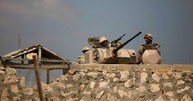
The Egyptian army on Friday opened fire at Palestinian fishing boats off the coast of the Gaza Strip following a similar attack on border employees.
Eyewitnesses told Quds Press that Israeli gunboats opened machinegun fire at Palestinian fishermen working within Gaza waters, off the shore of Rafah.
They affirmed that the fishermen survived the gunfire attack.
A few hours earlier, Egyptian soldiers opened fire at members of the Palestinian border committee, which is responsible for watching the border with Egypt.
Similar attacks had happened lately against Palestinian fishermen and young men, and led to the killing of some of them.
The Egyptian army had previously targeted posts belonging to the Palestinian national security on the border with Gaza.
Eyewitnesses told Quds Press that Israeli gunboats opened machinegun fire at Palestinian fishermen working within Gaza waters, off the shore of Rafah.
They affirmed that the fishermen survived the gunfire attack.
A few hours earlier, Egyptian soldiers opened fire at members of the Palestinian border committee, which is responsible for watching the border with Egypt.
Similar attacks had happened lately against Palestinian fishermen and young men, and led to the killing of some of them.
The Egyptian army had previously targeted posts belonging to the Palestinian national security on the border with Gaza.
20 jan 2016

Islamic Resistance Movement, Hamas, on Tuesday appreciated the Egyptian Administrative Court’s refusal of banning the entry of its members into the country. Hamas also welcomed the EU call for ending the siege on Gaza, reconstruction and opening the border crossings.
Hamas spokesman Sami Abu Zuhri said, in a statement on Tuesday, that Hamas believes that the decision is important and contributes to maintaining balance of the Egyptian position toward the Palestinian parties.
Abu Zuhri added that the court’s decision helps improve relations between Hamas and Cairo, hoping that it may speed up the opening of Rafah border crossing.
The Administrative Court in Egypt refused a lawsuit demanding barring members of Hamas Movement from entering or leaving the Egyptian land until the investigations in killing 16 of the Egyptian armed forces in Rafah come to an end.
The Egyptian Court of Urgent Matters last year cancelled a rule that blacklisted Hamas Movement as a terrorist group.
Hamas Movement also welcomed the statement of the EU Council of Ministers of Foreign Affairs which called for ending the siege on Gaza, reconstruction, opening of the crossings and refusing the settlement policy.
In a statement, Hamas also called on the EU to follow up on these resolutions and to take required procedures to guarantee their implementation.
Hamas agreed on the EU’s urging of the Palestinian Authority (PA) to practice its work in Gaza Strip. It opined that the PA’s success in this matter depends on its fulfillment of its duties towards Gaza with no discrimination among citizens or institutions.
Hamas spokesman Sami Abu Zuhri said, in a statement on Tuesday, that Hamas believes that the decision is important and contributes to maintaining balance of the Egyptian position toward the Palestinian parties.
Abu Zuhri added that the court’s decision helps improve relations between Hamas and Cairo, hoping that it may speed up the opening of Rafah border crossing.
The Administrative Court in Egypt refused a lawsuit demanding barring members of Hamas Movement from entering or leaving the Egyptian land until the investigations in killing 16 of the Egyptian armed forces in Rafah come to an end.
The Egyptian Court of Urgent Matters last year cancelled a rule that blacklisted Hamas Movement as a terrorist group.
Hamas Movement also welcomed the statement of the EU Council of Ministers of Foreign Affairs which called for ending the siege on Gaza, reconstruction, opening of the crossings and refusing the settlement policy.
In a statement, Hamas also called on the EU to follow up on these resolutions and to take required procedures to guarantee their implementation.
Hamas agreed on the EU’s urging of the Palestinian Authority (PA) to practice its work in Gaza Strip. It opined that the PA’s success in this matter depends on its fulfillment of its duties towards Gaza with no discrimination among citizens or institutions.
7 jan 2016
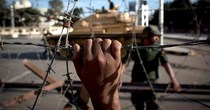
Egypt expressed its reservations regarding granting Turkey a role in the Gaza Strip siege, senior Israeli officials told Haaretz on Thursday.
These officials, who asked to remain anonymous due to the delicate diplomatic nature of the issue, stated that Egypt approached Israel asking for clarifications regarding recent progress in its reconciliatory talks with Turkey and asked whether Israel is intending to ease restrictions in the closure imposed on Gaza.
Haaretz quoted the diplomatic sources as stating that “the crisis between Egypt and Turkey is one of the factors making it difficult to reconcile with Turkey. The official noted that Prime Minister Benjamin Netanyahu is worried that any concession made to Turkey on Gaza in order to patch up relations will damage Israel’s strategic ties with Egypt.”
The sources pointed out that meetings were held over the past period between Egyptian and Israeli diplomats during which the Egyptians expressed opposition to any Israeli concessions to Turkey with regard to the Gaza Strip.
Senior Egyptian Foreign Ministry officials met with Israel’s ambassador Haim Koren and asked if these reports were correct and whether Israel and Turkey are indeed close to reconciling. The temporary chargé d’affaires at the Egyptian embassy in Tel Aviv delivered similar messages in a recent meeting with senior Foreign Ministry officials in Jerusalem, according to the newspaper.
Aside from demanding an apology for the Mavi Marmara killings and compensation for the victims' families, Turkey sees no normalization regarding ties with Israel unless its condition for ending the Gaza blockade is met.
These officials, who asked to remain anonymous due to the delicate diplomatic nature of the issue, stated that Egypt approached Israel asking for clarifications regarding recent progress in its reconciliatory talks with Turkey and asked whether Israel is intending to ease restrictions in the closure imposed on Gaza.
Haaretz quoted the diplomatic sources as stating that “the crisis between Egypt and Turkey is one of the factors making it difficult to reconcile with Turkey. The official noted that Prime Minister Benjamin Netanyahu is worried that any concession made to Turkey on Gaza in order to patch up relations will damage Israel’s strategic ties with Egypt.”
The sources pointed out that meetings were held over the past period between Egyptian and Israeli diplomats during which the Egyptians expressed opposition to any Israeli concessions to Turkey with regard to the Gaza Strip.
Senior Egyptian Foreign Ministry officials met with Israel’s ambassador Haim Koren and asked if these reports were correct and whether Israel and Turkey are indeed close to reconciling. The temporary chargé d’affaires at the Egyptian embassy in Tel Aviv delivered similar messages in a recent meeting with senior Foreign Ministry officials in Jerusalem, according to the newspaper.
Aside from demanding an apology for the Mavi Marmara killings and compensation for the victims' families, Turkey sees no normalization regarding ties with Israel unless its condition for ending the Gaza blockade is met.
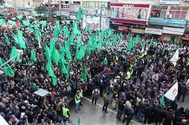
Islamic Resistance Movement, Hamas, affirmed its willingness to participate in forming a national unity government after convening a session for the provisional leadership of the Palestine Liberation Organization.
In a press statement on Wednesday evening, Hamas’s spokesman Sami Abu Zuhri called on the Palestinian Authority to pave the way for achieving the formation of a national consensus government as well as for halting the discrimination policy against the people of Gaza.
Abu Zuhri stressed the need to make certain political decisions that respect the sacrifices of the Palestinian people; most significant: ending the security coordination with Israel.
Hamas: We are ready for elections, and Abbas's claim "untrue"
The Hamas Movement has categorically denied that it opposes holding Palestinian elections, describing recent remarks by president Mahmoud Abbas in this regards as "untrue and unfounded."
Abbas claimed in a speech on Wednesday that Hamas had told him of its opposition to the holding of elections.
Hamas spokesman Sami Abu Zuhri denied such a claim and affirmed his Movement's willingness to participate in all forms of elections in accordance with the Cairo reconciliation agreement.
As for the issue of the Rafah border crossing, spokesman Abu Zuhri reiterated that his Movement wants the Palestinian government to assume its responsibilities for Gaza and the Rafah crossing, without giving pretexts.
The spokesman affirmed that Hamas has the right to hold consultations with the factions that proposed the recent initiative for ending the crisis of the Rafah crossing.
He also condemned Abbas for saying that the Egyptian authorities had the right to close the Rafah crossing, describing his remarks in this regard as an unacceptable justification for the closure of the crossing.
For his part, senior Hamas official and lawmaker Ismail al-Ashqar asserted that his Movement is "ready for the elections if held tomorrow", and accused Abbas of attempting to hold others responsible for his problems.
In a press statement on Wednesday evening, Hamas’s spokesman Sami Abu Zuhri called on the Palestinian Authority to pave the way for achieving the formation of a national consensus government as well as for halting the discrimination policy against the people of Gaza.
Abu Zuhri stressed the need to make certain political decisions that respect the sacrifices of the Palestinian people; most significant: ending the security coordination with Israel.
Hamas: We are ready for elections, and Abbas's claim "untrue"
The Hamas Movement has categorically denied that it opposes holding Palestinian elections, describing recent remarks by president Mahmoud Abbas in this regards as "untrue and unfounded."
Abbas claimed in a speech on Wednesday that Hamas had told him of its opposition to the holding of elections.
Hamas spokesman Sami Abu Zuhri denied such a claim and affirmed his Movement's willingness to participate in all forms of elections in accordance with the Cairo reconciliation agreement.
As for the issue of the Rafah border crossing, spokesman Abu Zuhri reiterated that his Movement wants the Palestinian government to assume its responsibilities for Gaza and the Rafah crossing, without giving pretexts.
The spokesman affirmed that Hamas has the right to hold consultations with the factions that proposed the recent initiative for ending the crisis of the Rafah crossing.
He also condemned Abbas for saying that the Egyptian authorities had the right to close the Rafah crossing, describing his remarks in this regard as an unacceptable justification for the closure of the crossing.
For his part, senior Hamas official and lawmaker Ismail al-Ashqar asserted that his Movement is "ready for the elections if held tomorrow", and accused Abbas of attempting to hold others responsible for his problems.
6 jan 2016
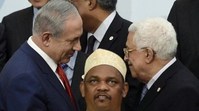
The Palestinian Authority Chairman Mahmoud Abbas said that “Egypt is free to close Rafah crossing”.
We have accepted the proposal backed by Palestinian factions for Rafah crossing crisis although it was not good; however Hamas has yet to reply to the initiative, Abbas said.
Abbas made his statements during a speech delivered in the occupied West Bank city of Bethlehem during Orthodox Christmas celebrations.
He blamed Hamas for “procrastinating” in handing over the Rafah crossing after “it refuses to join the unity government and participate in the next elections,” according to Abbas’ statements.
Commenting on Abbas’allegations, senior leader in Hamas Movement Salah Bardawil denied that his group received any official invitation for joining the unity government.
"Hamas is committed to the agreements signed with Fatah Group, mainly holding the PLO leadership meeting and forming a new Palestinian National Council," Bardawil added.
On the other hand, Abbas said his Palestinian Authority will remain and will not be dissolved.
“The PA is our achievement and we will not give it up,” Abbas declared.
He renewed his adherence to peaceful protests “because we are against violence and extremism.”
He also stressed his adherence to peace talks with Israel.
“The Executive Committee and the Central Committee of the PLO as well as commanders of Palestinian Authority security services will hold meetings next week to give the final decision and we will adhere with whatever they decide,” Abbas said Wednesday.
Commentators described Abbas's remarks as "disgrace" since he extends a hand to the Israeli occupation while strangling Palestinians mainly in the Gaza Strip with the other.
We have accepted the proposal backed by Palestinian factions for Rafah crossing crisis although it was not good; however Hamas has yet to reply to the initiative, Abbas said.
Abbas made his statements during a speech delivered in the occupied West Bank city of Bethlehem during Orthodox Christmas celebrations.
He blamed Hamas for “procrastinating” in handing over the Rafah crossing after “it refuses to join the unity government and participate in the next elections,” according to Abbas’ statements.
Commenting on Abbas’allegations, senior leader in Hamas Movement Salah Bardawil denied that his group received any official invitation for joining the unity government.
"Hamas is committed to the agreements signed with Fatah Group, mainly holding the PLO leadership meeting and forming a new Palestinian National Council," Bardawil added.
On the other hand, Abbas said his Palestinian Authority will remain and will not be dissolved.
“The PA is our achievement and we will not give it up,” Abbas declared.
He renewed his adherence to peaceful protests “because we are against violence and extremism.”
He also stressed his adherence to peace talks with Israel.
“The Executive Committee and the Central Committee of the PLO as well as commanders of Palestinian Authority security services will hold meetings next week to give the final decision and we will adhere with whatever they decide,” Abbas said Wednesday.
Commentators described Abbas's remarks as "disgrace" since he extends a hand to the Israeli occupation while strangling Palestinians mainly in the Gaza Strip with the other.

Hamas Movement said Tuesday evening that a committee has been formed to follow-up on the proposals and initiatives related to the opening of Rafah border crossing linking between Egypt and Gaza Strip.
The group’s spokesman Sami Abu Zuhri said his Movement started to make several contacts in order to ameliorate the humanitarian suffering of the population in Gaza and achieve the national unity and partnership.
"We will work along with all national parties to discuss the Rafah crossing crisis with our Egyptian brothers", he added.
Palestinian factions have earlier submitted a proposal to the Palestinian premier Rami Hamdullah and Hamas Movement to solve the Rafah crossing crisis.
In the same context, Second Deputy Speaker of the Palestinian Legislative Council Hassan Khreisheh said that the initiative tabled by Palestinian factions to broker a proposal for the reopening of the Rafah crossing with Egypt was “only a material for media consumption”.
The proposal only targeted concealing the political differences within the Palestinian Authority especially over the ongoing Intifada, he added.
The Palestinian Authority, he continued, is unable to solve Rafah crossing crisis as its closure decision was made by an Israeli, US, and Egyptian decision.
Khreisheh pointed out that the ongoing efforts mainly aim at removing Hamas Movement from the political scene.
The group’s spokesman Sami Abu Zuhri said his Movement started to make several contacts in order to ameliorate the humanitarian suffering of the population in Gaza and achieve the national unity and partnership.
"We will work along with all national parties to discuss the Rafah crossing crisis with our Egyptian brothers", he added.
Palestinian factions have earlier submitted a proposal to the Palestinian premier Rami Hamdullah and Hamas Movement to solve the Rafah crossing crisis.
In the same context, Second Deputy Speaker of the Palestinian Legislative Council Hassan Khreisheh said that the initiative tabled by Palestinian factions to broker a proposal for the reopening of the Rafah crossing with Egypt was “only a material for media consumption”.
The proposal only targeted concealing the political differences within the Palestinian Authority especially over the ongoing Intifada, he added.
The Palestinian Authority, he continued, is unable to solve Rafah crossing crisis as its closure decision was made by an Israeli, US, and Egyptian decision.
Khreisheh pointed out that the ongoing efforts mainly aim at removing Hamas Movement from the political scene.
Page: 2 - 1
